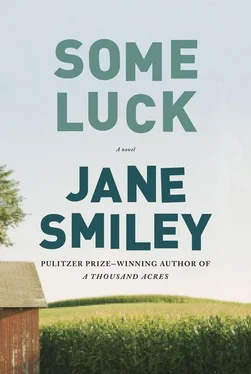Frank looked at her.
“It’s no big deal. Some guys like boys and girls. Maybe you don’t like anyone so far. That happens, too.” She shrugged and put on her top. They waited a few minutes in silence. Frank could hear occasional noises from below, steps out in the hall.
When they rejoined the group at the top of the stairs, Lawrence was still with his whore, but it was okay, Frank thought. It was nicer with more girls. Pixie sat down on the sofa, and patted the spot next to her. One of the knitting girls said, “So — where are you from?”
“Usherton.”
“Yeah? I’m from Mason City myself. Lizzie here is from Rochester, Minnesota. But most of the girls are from Chicago.”
Frank said, “What about you, Pixie?”
“Who, me?” She licked the tips of her fingers and smoothed her hair back. “I’m from down south of St. Louis. Cairo. It’s on the river there.”
Lizzie said, “Well, it’s nice to have a good-looking fellow like yourself come around. There’s not a lot of that.” She leaned forward and kissed him hard. He liked it.
Pixie said, “You should come back sometime midweek. It’s not so busy.”
Lawrence and his whore emerged from one of the rooms. He had his arm around her waist. On the way home, Frank said, “Why do they do this?”
“It’s a living,” said Lawrence. “There’s a Depression on. People live in tents and shoot rabbits. What else are they going to do? Lizzie’s dad died of diphtheria, and that was the end of their farm. Some are nymphos, though.”
Frank pondered the whores for most of the next week.
AT THE BEGINNING of the third quarter, Frank got a job that paid more, one that would keep him in Ames through the summer. Since he planned to move back into his tent, he expected to save quite a bit of money. His boss, who was an assistant professor in the Chemistry Department, wanted to burn cornstalks in a way that would make them usable for gunpowder. Frank foresaw that when the gunpowder was perfected, he and his boss, Professor Cullhane, would put it to use. But it was not perfected yet. It was an interesting idea, though — a field of corn as a weapon.
Frank saw himself as something of a ghost around the campus. He had given up all ideas of Sigma Chi or Sigma Nu. He didn’t mind the kids in his classes and liked walking across the campus with this one or that one — he had retained his habit of being nice to all the girls, and so he always had someone to walk with. He was good at carrying books, or, since he had brought the cruiser back from the farm, riding a girl to the library. There was one girl, Annie Haines, in his history class, who liked to sit on his handlebars and be pedaled around town. She was pretty brave, and once in a while he kissed her, but that was all. She didn’t know where he lived, though if she’d looked out of her window in her freshman dorm rooms, she would have seen the rooming house across Lincoln Way where his room was. But it suited him that no one knew where he lived other than Lawrence, and Lawrence was sworn to secrecy. Lawrence kept the secret, too — not because he honored Frank’s wishes, but because he liked secrets. The reason Frank didn’t try to join a fraternity was that, apart from Lawrence and the girls, his fellow students interested him only for observation.
He wrote two essays for Lawrence. One was about the Russian Revolution and Trotsky, Lenin, and Stalin. This one was easy to write — all he had to do was reproduce Julius’s “line” on Trotsky, that while he was out in the field during the last year of Lenin’s life, when Lenin was so debilitated by strokes, Trotsky was doing the real work of running the army and taking care of administrative business, but Stalin was back in the Kremlin, extending his influence over everyone in the Politburo. Stalin’s betrayal of Trotsky only prefigured his betrayal of his erstwhile colleagues and the revolution itself. Lawrence received an A on the essay, and was told that his thinking was “Very astute. You’ve been paying better attention than I thought, Mr. Field.” In the second essay, “Lawrence” wrote about Richard III. He compared the feuds between the House of Lancaster and the House of York to the feuds in the Communist Party in the Soviet Union, and likened Richard to Stalin, “even in terms of height and looks.” He ended the paper with a few remarks about how humans remain constant through the ages, in spite of ever-changing theories of human nature. This essay also received an A. The professor considered Lawrence’s argument “unorthodox but intriguing.” As a result of these two papers, Lawrence did not flunk out of school, but he did have to retake his physics class.
Frank would not have said that he asked for anything in return, but he appreciated Lawrence’s generosity — a meal here and there, another ride to Chicago (though not to Little Chicago), a pair of boots that his mother sent that happened to be too big for Lawrence (and why two sizes too big, Frank didn’t ask). The spring progressed from dogwood through lilacs, and Frank enjoyed himself. There were lots of ways to fit into a place like Iowa State College, and one of them was not to fit in at all.
WHEN HE PLANTED Rolf’s cornfield, Joe decided to breed a hybrid. Actually, it was a bit of an accident. Papa had saved seed from the fall crop (back up to forty bushels an acre, but what good did that do you when the price was twelve cents a bushel?). When Joe checked the seed, there wasn’t enough of it to begin with, and some of what they had was infected with a fungus. Grandpa Wilmer had some seed corn, too, but not much, and of a different variety. What got Joe going was that Grandpa Wilmer’s variety would grow taller than what Papa had, so he just filled the seeders — three rows of Papa’s, then a row of Grandpa Wilmer’s, from one end of Rolf’s field to the other. He didn’t say a thing about it to Papa, at least until the corn was about chest-high, when Papa noticed the difference between the rows. He brought it up one Sunday in July when all the grandparents were over for Sunday supper. Papa was smiling when he said it, but Joe knew he didn’t approve. He looked around the table and said, “Joey’s going into business.”
“What’s that?” said Granny Elizabeth. “Wasn’t Frankie good at earning money, too? Those fox skins he had were beauties. When was that?”
“Joey’s sort of business is the sort where you pour time and money down a deep hole.”
“Oh, Walter,” said Mama, “what could you possibly be talking about? Joey does what you tell him.”
“We didn’t tell him to grow seed corn when we said he could take over Rolf’s farm.”
“What does that mean?” said Mama, and Grandpa Wilmer said, “I’ll buy it.”
Joe thanked him.
Grandpa Otto said, “Opa tried that for a couple of years. He detasseled every other row and saved that seed for the next year. Lots of work, nothing gained.”
“That’s not what I’m going to do,” said Joe. “I’m going to detassel the rows I planted from Papa’s seed, and let Grandpa Wilmer’s seed pollinate those plants.”
“What are those rows, four to one?” said Grandpa Wilmer.
“Three to one,” said Joe.
“Lotta work. That’s a big field.”
Joe shrugged, then said, “I bet I can get it done before the oat harvest. I bet I can.”
Grandpa Wilmer said, “That was good seed. Pretty high yield.”
“What good is that?” said Walter.
“Prices are rising,” said Grandpa Wilmer.
Grandma Elizabeth and Oma each said something in German, then Grandpa Otto. Walter said, “Well, tell the rest of us.”
Grandpa Otto said, “She said, ‘War in Europe raises prices in Iowa.’ ”
Papa said, “There isn’t going to be a war in Europe. They learned their lesson the last time.”
Читать дальше












